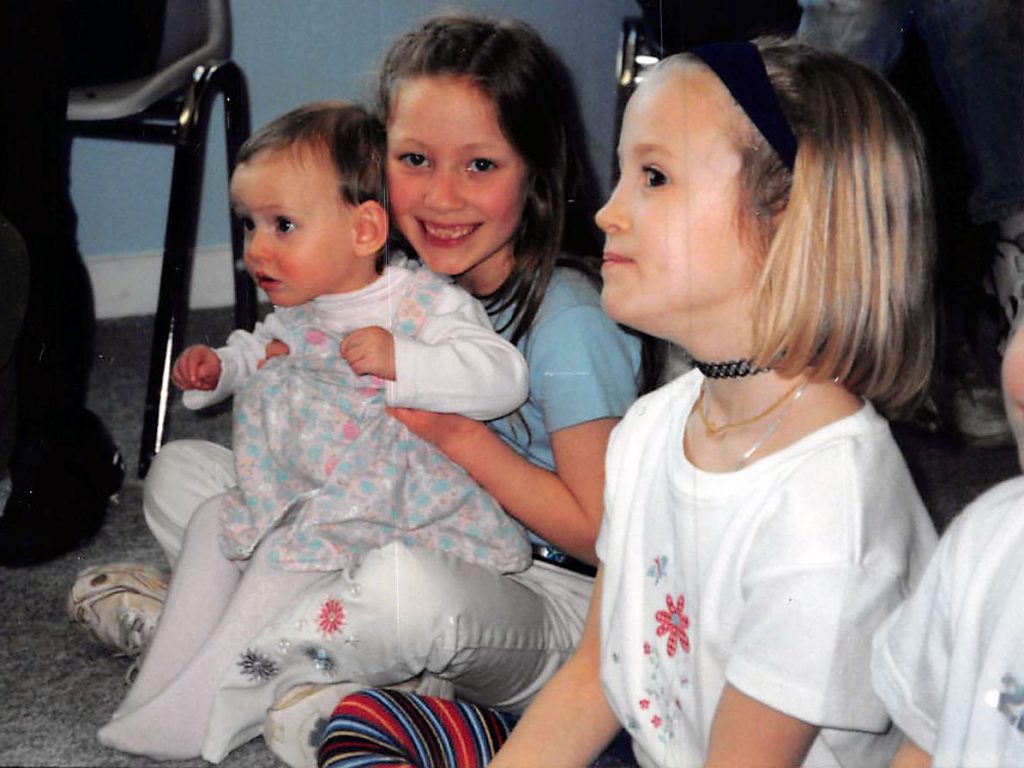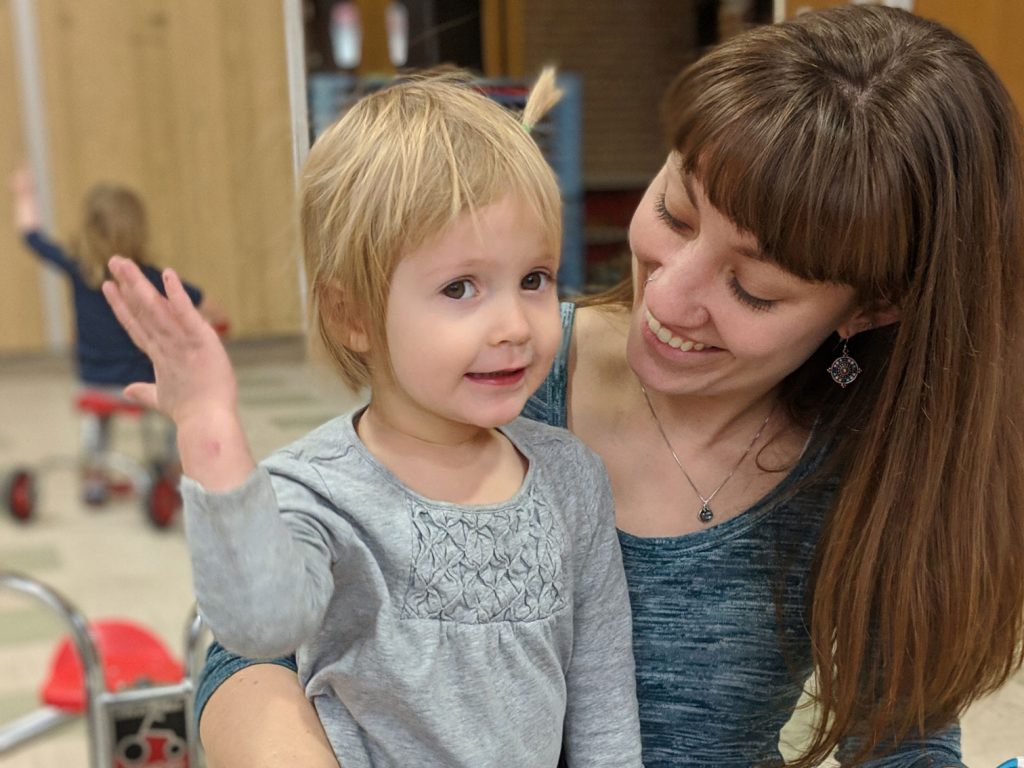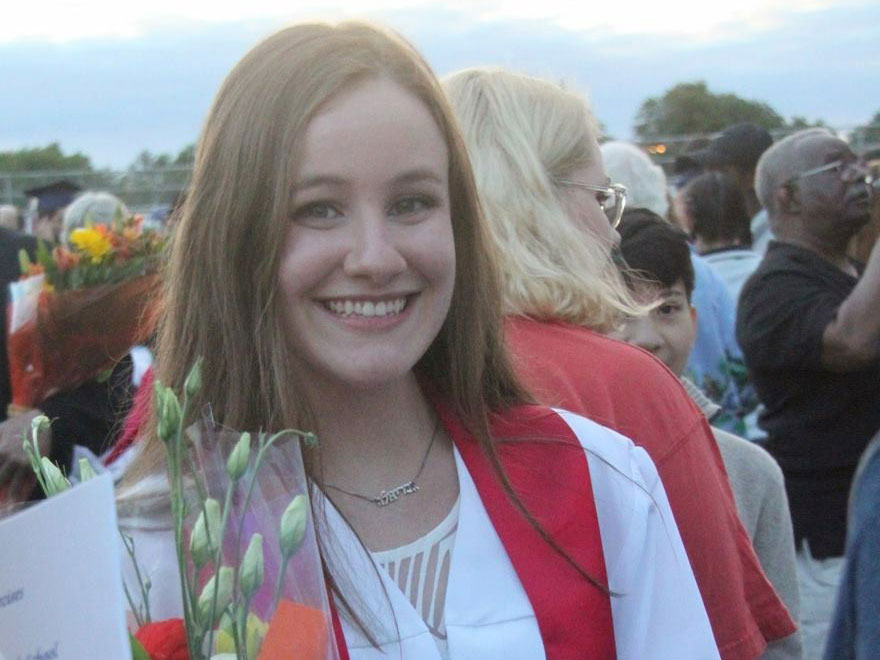Freedom within Boundaries: Liz ’05 and Gabi Isaac-Herzog ’11
The sisters learned to pursue their passions at Miquon, where they were trusted and supported in their choices.
Although more than five years separate the Isaac-Herzog sisters, it’s obvious they are close, connected through their shared family values and educational experiences, and bonded over their love of children and teaching.
When the girls’ parents were searching for an alternative education for Liz, 26, they enrolled her in a Montessori preschool, and the principal suggested Miquon for her subsequent elementary education. Once the family was at Miquon, her father became a tour guide, showing prospective students and their families around the campus. He often could be heard summing up parts of the Miquon experience as “freedom within boundaries” for its young students.
What Sort of Freedom, Exactly?
“It’s a place where kids are given room to explore,” explains Liz.
In particular, Miquon students are given a lot of trust and responsibility to explore the depth and breadth of what interests them in age-appropriate ways. This happens in their free play, and also, in the academic subjects.
Neither Liz nor her sister, Gabi, really remembers specific lessons. Rather, they recall the subjects they chose to explore deeply because those subjects were interesting—to them.
In the younger years, this involved animals and the environment. Liz was excited about wolves, so she was able to study them for a class project. Gabi, on the other hand, learned about beluga whales. Regardless of the subject matter, in both cases the girls learned research skills, they created posters, and they presented their findings to the class.
In the older grades, they got involved with deeper research projects, although perhaps not in the traditional sense.
Gabi clearly remembers various simulations she was part of: one about Ellis Island in third and fourth grade, in which the students got to take on an imaginary role of an actual time period character and experience what it might have been like to cram into a ship and travel across the ocean only to face interrogation and possible deportation in the new country.
“It was heavy material, but presented in an age-appropriate way,” Gabi says, adding that when she completed her gap year at Miquon recently, the class was talking about social justice, race, and sustainability.
“And the kids got it, because it was presented appropriately. Miquon doesn’t make the assumption that kids won’t get something,” she adds.
Another role-play simulation helped the students learn about America’s westward expansion by “becoming” pioneers who traveled the Oregon Trail. Each student chose to be a certain character with an occupation and wrote journal entries.
In wagon train groups, facing common “hardships,” the students immersed themselves in the time period and came to deeply understand the challenges faced by the pioneers at the time. A real-life lesson in accounting, geography, and civics, they had to select their supplies, operate using a budget, plan their travel routes, negotiate conflicts and solve problems together with their classmates.
“We learned to be part of a team and how to be accountable for our actions. Trust and responsibility was created between group members,” says Gabi.
Liz’s memories of the bridge-building project with teacher Lynn Hughes are strong and emblematic of the type of fun project at Miquon through which all kinds of learning was taking place.
“We learned engineering, the strength of triangles, how to test different types of bridges and then build them,” she says.
The children also used computer software to play around and test the viability of different bridge designs.
“We had a certain amount of money to budget; we learned how to write checks to buy the glue and toothpicks; and we learned to work in groups. Lynn and my dad noticed that I delegated different tasks to different people based on what they were good at, because I knew that everyone brings something different to the table, which I learned because Miquon teachers see you as you are, and they meet you there.”
Freedom Out-of-doors
Just as the children are entrusted to pursue their passions inside the classroom, Miquon students enjoy freedoms within boundaries outside as well.
The sisters recall running outdoors, coming into classrooms panting, rumpled and dirty. Sometimes individual classes would meet before or after school to sit outside, listening to the sounds of the wildlife and making observations.
“Those dawn and dusk studies were magical, interesting and meditative,” says Gabrielle.
Miquon students benefit from 30 minutes of time in the morning and again in the afternoon to make active choices about their activities. Some head to the library, music, or art room. Most children, however, opt to spend the time outdoors—engaged in a game of all-campus tag, building dams in the creek, or shooting hoops on the basketball court, to name a few. Gabrielle adds that up until 5th grade, students at Miquon are alerted through a distinctive bell when their Choice Time is ending.
“Every year, our physical boundaries grew [on campus] for Choice Time, because children were taught and then trusted to stay within the acceptable boundaries for their age. When boundaries expand in 5th and 6th grade, students are responsible for coming in on time,” Gabrielle says. “They wear a watch or connect with someone who does.”
Trust Among Peers
Without a doubt, the age-appropriate freedoms allowed Liz and Gabi to develop a sense of responsibility and self-confidence. They also grew their empathy skills and learned to look out for their peers at Miquon, which spends an ample amount of time focused on Social Emotional Learning (SEL) and places a huge emphasis on taking care of one another.
The buddy system, for example, where the youngest children are assigned students in higher grades who become their buddy for the year, allows all ages to bond and form compassionate relationships. Times are scheduled to play, read and join for assembly, and the older children model what good behavior looks like.
 Liz and Gabi Isaac-Herzog at Miquon
Liz and Gabi Isaac-Herzog at Miquon“This helps the older students develop patience, compassion and the ability to teach in a respectful way. It was exciting for me because I always wanted a younger sibling, and I felt that nice connection in my buddy relationship,” says Gabrielle.
“It bridges the gap between older and younger and is a perfect way for passing down Miquon’s expectations in a gentle way,” she adds.
A Love of Teaching
Currently, Liz works at a preschool in St. Paul, Minnesota, where she is also doing her prerequisite work to enter a master’s/licensure program in elementary education. When recalling all of the benefits of her Miquon education, she cites the book, Troublemakers: Lessons in Freedom from Young Children at School, by Carla Shalaby.
“The author argues that love and freedom are too often missing from classrooms and they’re not words we traditionally associate with the classroom, but we probably should,” explains Liz.
Working with 2-year-old children, it is easy for Liz to recognize that love and freedom are inherent in a preschool setting. The freedom comes in observing what the kids show interest in and the subsequent play-based learning.
“We provide them the environment to pursue what they like, which is what I want to tie into my future classroom someday, and it’s what I had at Miquon! I was lucky enough to have had that approach to teaching and raising kids as a community, and my dream would be that every single school could be like Miquon,” she says. “I had trust in my teachers and they trusted us.”
 Liz Isaac-Herzog ’05 now works with children in a St. Paul preschool
Liz Isaac-Herzog ’05 now works with children in a St. Paul preschool“Teaching is helping kids become who they are,” she says. “Being there to guide and support them . . . learning how I can help them embrace who they are.”
Also Inspired to Teach
Gabrielle also chose Macalester College in St. Paul (her entrance essay was about Miquon and the lasting nature of the values instilled there), where she is leaning toward geography and environmental studies as her majors of choice. She expects to graduate in 2022.
“Geography is considered a synthesizing discipline, pulling interdisciplinary information together to figure out specifics and unique qualities of a place and how that place fits into the bigger picture of the world,” Gabrielle says. “It’s a process taught at Miquon and something we were taught to do with ourselves—figure out our uniqueness and celebrate how it fits into the bigger system of our community and the world.”
“I went through phases at Miquon . . . wondering what I wanted to study and do,” says Gabrielle. “I wanted to be a chef for a while, and in 5th grade, my month-long personal project was making French soups.”
Another personal project involved babysitting for the one-year-old child who lived next door and observing and recording her behavior. In middle school, Gabrielle discovered a love of science, and wanted to be a doctor, a dream she carried throughout high school. Then, at one point, she realized that she had been “into working with kids her whole life” and, although she had planned to travel and do some farming in France for her gap year after high school graduation (as Liz had done) she returned to Miquon instead.
“My year there solidified that realization,” she says. “Even the things that people might not enjoy about teaching, I did. I talked to my old teachers who recalled how I would play ‘school’ at Choice Time, and I was the teacher every time.
“I had a passion I hadn’t considered then, but they saw in me, and yet, they let me pursue all those other interests, so that ultimately, it was my choice,” she says. “I see it as a hybrid of a web and a ladder, in which both forward and lateral growth and movement are possible. Now I know that I want to teach—with such conviction. Without that exploration, it’s hard to really know.”
 Gabrielle Isaac-Herzog ’11 at her graduation from Plymouth-Whitemarsh High School
Gabrielle Isaac-Herzog ’11 at her graduation from Plymouth-Whitemarsh High School